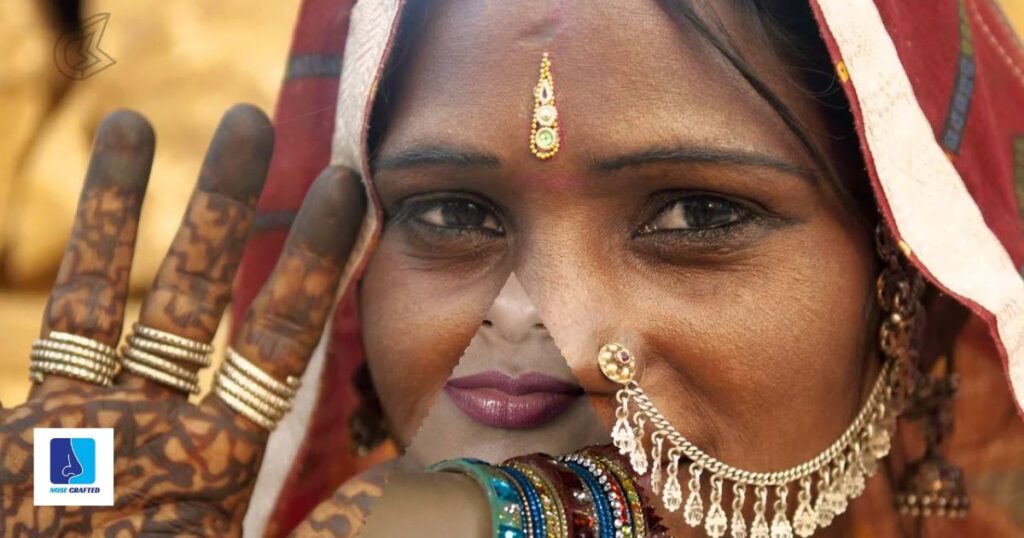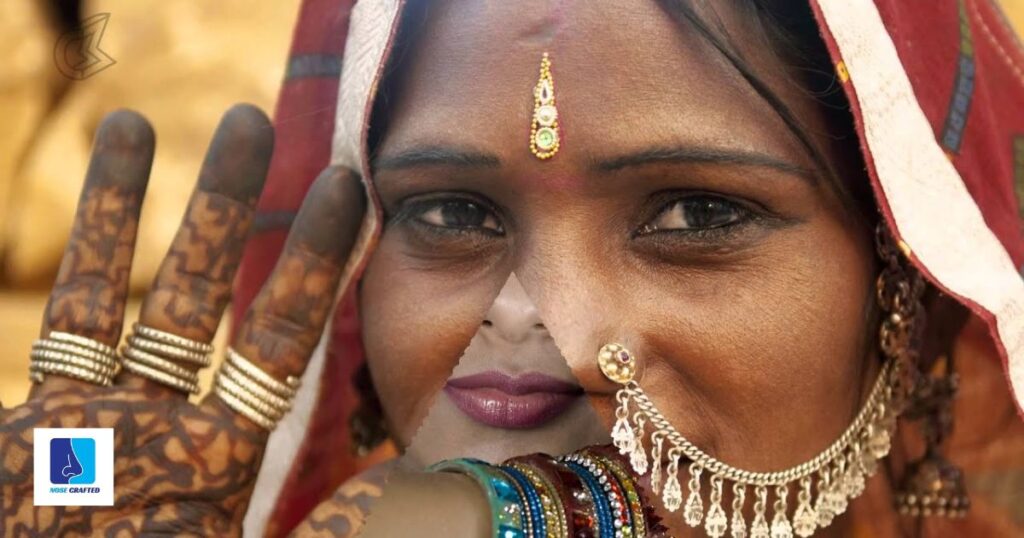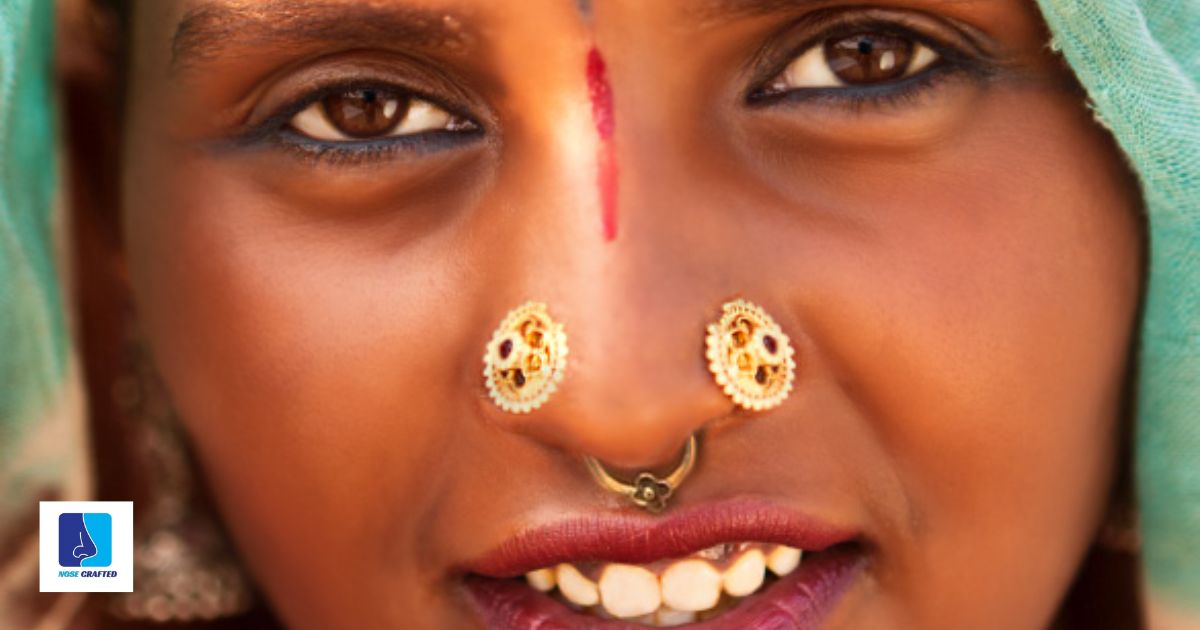Nose piercing is a form of body modification where a small hole is made in the tissue of the nose to insert jewelry. It’s a cultural practice dating back centuries, found in various societies worldwide. Nose piercings can be decorative or hold cultural significance, representing rites of passage or personal expression. The procedure involves piercing the nostril or septum with a needle or piercing gun.
Discover the rich tapestry of self-expression with nose piercing, a cultural phenomenon that transcends boundaries. Uncover the significance of Nose Piercing Meaning In Hindi as more than just a fashion statement but a symbol of tradition and identity. Embrace the artistry and heritage behind this ancient practice and embark on a journey of personal style and cultural exploration.
Nose Piercing Meaning In Hindi refers to the significance of nose piercing in Indian culture, where it’s known as “nath” or “nathni.” In Hindi tradition, nose piercings hold cultural and religious significance, often symbolizing marital status or serving as a traditional adornment for women during special occasions like weddings and festivals.
The Rituals and Symbolism

In Indian culture, nose piercing is far more than just a fashion statement; it’s deeply intertwined with rituals and symbolism. Traditionally, nose piercing holds immense significance as a rite of passage, marking important transitions in one’s life. For young girls, it often symbolizes their journey into womanhood, signifying maturity and readiness for marriage. Beyond personal milestones, nose piercings also carry social and religious connotations.
This blend of ritual and symbolism not only enriches the cultural fabric of India but also fosters a deeper connection to one’s heritage and identity. Nose piercing rituals serve as a link between past traditions and contemporary life, reminding individuals of their roots and the values they hold dear. Whether worn as a personal adornment or as part of a cultural ceremony, nose piercings continue to be cherished as a symbol of tradition, spirituality, and self-expression across diverse communities in India.
Nose Piercing as a Rite of Passage
Nose piercing as a rite of passage marks significant transitions in many cultures worldwide. It symbolizes the journey from adolescence to adulthood, often serving as a visible sign of maturity and responsibility. Across various societies, this ritual signifies entrance into a new stage of life, where individuals embrace their identity and cultural heritage. Whether it’s a traditional ceremony or a personal decision, nose piercing embodies the transition from youth to maturity, carrying with it a sense of pride and belonging within one’s community.
Marital Status and Social Significance
In many cultures, including Hindi tradition, nose piercings carry profound significance regarding marital status and societal standing. Among married women, a nose piercing often symbolizes commitment and signifies their marital status, serving as a visual marker of their union. Conversely, in some communities, an unmarried woman may choose not to pierce her nose, indicating her single status. Beyond individual relationships, nose piercings can also reflect broader social dynamics and community norms, underscoring the importance of tradition and the role of personal adornment in shaping social identity.
Religious and Spiritual Connotations
Religious and spiritual connotations associated with nose piercing encompass a profound significance in various cultures. Across traditions, nose piercing symbolizes spiritual awakening, inner strength, and alignment with divine energies. In Hinduism, it may represent devotion to gods and goddesses, with specific piercings dedicated to particular deities. In some Native American cultures, nose piercing holds spiritual significance, signifying connection to ancestors and the spirit world. Moreover, in certain African tribes, nose piercings are linked to spiritual rituals, marking transitions and protection from negative energies.
Nose Piercing Meaning In Urdu

1. Cultural Symbolism: Nose piercing, known as “ناک کی سونگھنا” (Naak ki soonghna) in Urdu, holds significant cultural symbolism in various communities.
2. Traditional Practices: In Urdu culture, nose piercing is often a traditional practice passed down through generations, symbolizing beauty, femininity, and maturity.
3. Rituals and Rites of Passage: It frequently serves as a rite of passage for young women, marking their transition into adulthood and marriage.
4. Spiritual Significance: Some Urdu traditions attribute spiritual significance to nose piercings, viewing them as a means to ward off evil spirits and bring good luck.
5. Fashion and Personal Expression: In modern times, nose piercing in Urdu culture is also seen as a form of personal expression and fashion statement, allowing individuals to showcase their style and identity.
6. Family and Social Acceptance: Despite changing trends, nose piercing continues to be widely accepted and encouraged within Urdu families and society as a whole.
7. Celebratory Occasions: Nose piercing ceremonies are often celebrated with joy and festivity, highlighting the cultural importance and significance attached to this practice in Urdu communities.
Nose Piercing Meaning In English
Nose piercing holds diverse meanings in English-speaking cultures, symbolizing personal expression, fashion, and sometimes rebellion. It’s a form of body modification where a small hole is made in the tissue of the nose to insert jewelry. While it’s often associated with individual style and beauty trends, nose piercings can also carry cultural significance, representing rites of passage or cultural identity for some communities. Whether as a fashion statement or a nod to tradition, nose piercing in English culture reflects the multifaceted nature of self-expression and personal identity.
Nose Piercing Meaning In Hinduism

Nose piercing holds deep significance in Hinduism, symbolizing various aspects of spiritual and cultural identity. In Hindu tradition, nose piercing, known as “nath,” is considered auspicious and is often associated with marital status and fertility. back nose piercing It is believed to activate the Ajna Chakra, the energy center located between the eyebrows, enhancing intuition and promoting overall well-being. Additionally, nose piercing is seen as a mark of devotion to Lord Shiva and Goddess Parvati, with references in Hindu mythology. Beyond its religious connotations, nose piercing in Hinduism serves as a revered cultural practice, connecting individuals to their heritage and spiritual roots while also embracing personal adornment and self-expression.
Got Piercing Meaning
“Got Piercing Meaning” delves into the significance behind the act of body piercing. Beyond mere decoration, piercings often carry cultural, spiritual, or personal meanings. They can symbolize rites of passage, cultural identity, or acts of rebellion. Whether it’s an ear, nose, or belly button piercing, each choice reflects individuality and holds a unique story. Understanding the deeper meanings behind piercings allows for a deeper appreciation of this ancient practice, connecting us to our past and present selves.
पियर्स मीनिंग इन हिंदी

Sure, here’s a simple table for “पियर्स मीनिंग इन हिंदी” (Piercing Meaning in Hindi):
| पियर्स मीनिंग इन हिंदी |
| पियर्स |
| हिंदी |
| मतलब |
| शरीर में छेद बनाना और उसमें सोने का आभूषण डालना |
| विशेष रूप से कान, नाक, ओर नाभि में किया जाता है |
| बॉडी मॉडिफिकेशन का एक रूप |
| कला या सांस्कृतिक प्रक्रिया के रूप में भी किया जा सकता है |
| स्वयं अभिव्यक्ति का माध्यम |
Piercing Meaning In Bengali
“Piercing Meaning In Bengali” delves into the cultural significance of body modifications within the Bengali community. In Bengali culture, piercings hold deep-rooted meanings, often symbolizing rites of passage, religious affiliations, or familial traditions. These piercings, ranging from ear and nose piercings to elaborate body adornments, serve as expressions of identity and cultural heritage. Understanding the significance of piercings in Bengali society provides insight into the rich tapestry of traditions and beliefs that shape individual and collective identities.
FAQ,s
What is the meaning of nose piercing?
The meaning of nose piercing varies across cultures but often signifies cultural identity, beauty, spirituality, or rites of passage.
Why is nose piercing done?
Nose piercing is done for various reasons, including cultural traditions, religious significance, personal expression, and fashion trends.
Are nose piercings haram?
The permissibility of nose piercings (haram) varies among different Islamic scholars and interpretations.
What does nose piercing mean in India?
In India, nose piercing holds cultural significance, symbolizing tradition, marital status, and sometimes religious affiliation.
Conclusion
In conclusion, nose piercing serves as more than just a fashion statement; it embodies a profound cultural and societal significance in India. From its origins steeped in tradition to its evolution as a symbol of personal identity and style, nose piercing reflects the rich tapestry of Indian culture. Whether representing marital status, religious beliefs, or simply individual expression, the practice of nose piercing continues to thrive as a timeless tradition, bridging the past with the present.
Overall, nose piercing in India showcases the dynamic interplay between tradition and modernity. It underscores the importance of cultural heritage while embracing the ever-changing landscape of personal adornment and self-expression. As individuals continue to adorn their noses with pride and reverence, the tradition of nose piercing remains a vibrant symbol of identity and cultural pride in India.








